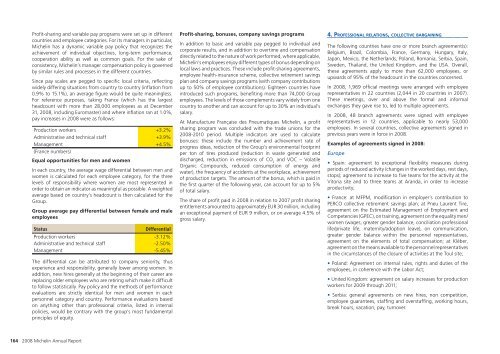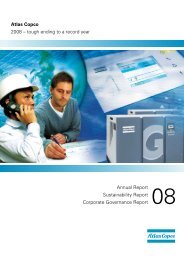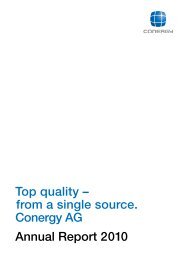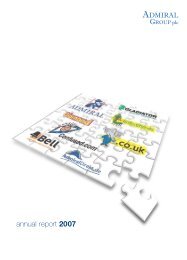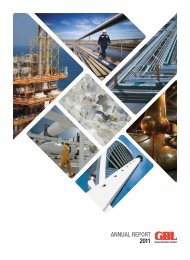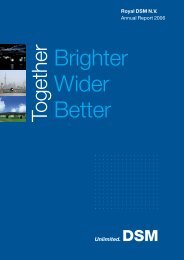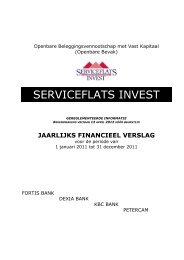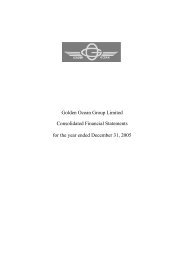MICHELIN - 2008 ANNUAL REPORT
MICHELIN - 2008 ANNUAL REPORT
MICHELIN - 2008 ANNUAL REPORT
You also want an ePaper? Increase the reach of your titles
YUMPU automatically turns print PDFs into web optimized ePapers that Google loves.
Profit-sharing and variable pay programs were set up in different<br />
countries and employee categories. For its managers in particular,<br />
Michelin has a dynamic variable pay policy that recognizes the<br />
achievement of individual objectives, long-term performance,<br />
cooperation ability as well as common goals. For the sake of<br />
consistency, Michelin’s manager compensation policy is governed<br />
by similar rules and processes in the different countries.<br />
Since pay scales are pegged to specific local criteria, reflecting<br />
widely differing situations from country to country (inflation from<br />
0.9% to 15.1%), an average figure would be quite meaningless.<br />
For reference purposes, taking France (which has the largest<br />
headcount with more than 28,000 employees as at December<br />
31, <strong>2008</strong>, including Euromaster) and where inflation ran at 1.0%,<br />
pay increases in <strong>2008</strong> were as follows:<br />
Production workers +3.2%<br />
Administrative and technical staff +3.9%<br />
Management +4.5%<br />
(France numbers)<br />
Equal opportunities for men and women<br />
In each country, the average wage differential between men and<br />
women is calculated for each employee category, for the three<br />
levels of responsibility where women are most represented in<br />
order to obtain an indicator as meaningful as possible. A weighted<br />
average based on country’s headcount is then calculated for the<br />
Group.<br />
Group average pay differential between female and male<br />
employees<br />
Status<br />
Differential<br />
Production workers -3.12%<br />
Administrative and technical staff -2.50%<br />
Management -5.45%<br />
The differential can be attributed to company seniority, thus<br />
experience and responsibility, generally lower among women. In<br />
addition, new hires generally at the beginning of their career are<br />
replacing older employees who are retiring which make it difficult<br />
to follow statistically. Pay policy and the methods of performance<br />
evaluations are strictly identical for men and women in each<br />
personnel category and country. Performance evaluations based<br />
on anything other than professional criteria, listed in internal<br />
policies, would be contrary with the group’s most fundamental<br />
principles of equity.<br />
Profit-sharing, bonuses, company savings programs<br />
In addition to basic and variable pay pegged to individual and<br />
corporate results, and in addition to overtime and compensation<br />
directly related to the nature of work performed, where applicable,<br />
Michelin’s employees enjoy different types of bonus depending on<br />
local laws and practices. These include profit-sharing agreements,<br />
employee health-insurance scheme, collective retirement savings<br />
plan and company savings programs (with company contributions<br />
up to 50% of employee contributions). Eighteen countries have<br />
introduced such programs, benefiting more than 74,000 Group<br />
employees. The levels of those complements vary widely from one<br />
country to another and can account for up to 30% an individual’s<br />
salary.<br />
At Manufacture Française des Pneumatiques Michelin, a profit<br />
sharing program was concluded with the trade unions for the<br />
<strong>2008</strong>-2010 period. Multiple indicators are used to calculate<br />
bonuses: these include the number and achievement rate of<br />
progress ideas, reduction of the Group’s environmental footprint<br />
per ton of tires produced (reduction in waste generated and<br />
discharged, reduction in emissions of CO 2<br />
and VOC – Volatile<br />
Organic Compounds, reduced consumption of energy and<br />
water), the frequency of accidents at the workplace, achievement<br />
of production targets. The amount of the bonus, which is paid in<br />
the first quarter of the following year, can account for up to 5%<br />
of total salary.<br />
The share of profit paid in <strong>2008</strong> in relation to 2007 profit sharing<br />
entitlements amounted to approximately EUR 30 million, including<br />
an exceptional payment of EUR 9 million, or on average 4.5% of<br />
gross salary.<br />
4. PROFESSIONAL RELATIONS, COLLECTIVE BARGAINING<br />
The following countries have one or more branch agreement(s):<br />
Belgium, Brazil, Colombia, France, Germany, Hungary, Italy,<br />
Japan, Mexico, the Netherlands, Poland, Romania, Serbia, Spain,<br />
Sweden, Thailand, the United Kingdom, and the USA. Overall,<br />
these agreements apply to more than 62,000 employees, or<br />
upwards of 95% of the headcount in the countries concerned.<br />
In <strong>2008</strong>, 1,969 official meetings were arranged with employee<br />
representatives in 22 countries (2,044 in 20 countries in 2007).<br />
These meetings, over and above the formal and informal<br />
exchanges they gave rise to, led to multiple agreements.<br />
In <strong>2008</strong>, 48 branch agreements were signed with employee<br />
representatives in 12 countries, applicable to nearly 53,000<br />
employees. In several countries, collective agreements signed in<br />
previous years were in force in <strong>2008</strong>.<br />
Examples of agreements signed in <strong>2008</strong>:<br />
Europe<br />
Spain: agreement to exceptional flexibility measures during<br />
periods of reduced activity (changes in the worked days, rest days,<br />
stops); agreement to increase to five teams for the activity at the<br />
Vitoria site and to three teams at Aranda, in order to increase<br />
productivity;<br />
France: at MFPM, modification in employer’s contribution to<br />
PERCO collective retirement savings plan; at Pneu Laurent Tire,<br />
agreement on the Estimated Management of Employment and<br />
Competencies (GPEC), on training, agreement on the equality men/<br />
women (wages, greater gender balance, conciliation professional<br />
life/private life, maternity/adoption leave), on communication,<br />
greater gender balance within the personnel representatives,<br />
agreement on the elements of total compensation; at Kléber,<br />
agreement on the means available to the personnel representatives<br />
in the circumstances of the closure of activities at the Toul site;<br />
Poland: Agreement on internal rules, rights and duties of the<br />
employees, in coherence with the Labor Act;<br />
United Kingdom: agreement on salary increases for production<br />
workers for 2009 through 2011;<br />
Serbia: general agreements on new hires, non competition,<br />
employee guarantees, staffing and overstaffing, working hours,<br />
break hours, vacation, pay, turnover.<br />
164 <strong>2008</strong> Michelin Annual Report


